When you think of Pittsburgh Penguins’ rivalries, which teams come to mind? The Philadelphia Flyers, Washington Capitals, and… St. Louis Blues?
Today, with the teams in separate conferences, meeting just twice each regular season, and having not squared off in the playoffs since 1981, it’s hard to imagine a time when these clubs were bitter enemies. A wild 1969-70 season and 1970 Stanley Cup Semifinal series, however, solidified a hatred that hung around until the Penguins became a part of the Norris Division during the 1974-75 season.
The Next Six Expansion Sets the Stage
The NHL held its first big expansion in 1967, adding six new teams – the Penguins, Blues, Flyers, Los Angeles Kings, Minnesota North Stars, and Oakland Seals – to the “Original Six” lineup. The original teams made up the East Division, while the new teams, though scattered across the United States, made up the West Division.
With only 12 teams total in the NHL, it was common for clubs in the same division to play each other 10 times in a season, often with home-and-home series that left players and coaches from both teams hopping buses and catching planes after a final buzzer to traverse across the country for the next night’s matchup.
Whether from fatigue, inexperience, or just plain bad luck, the Penguins’ first two seasons in the NHL were nothing special. They finished fifth in the West Division and failed to make the playoffs in both 1968 and 1969.
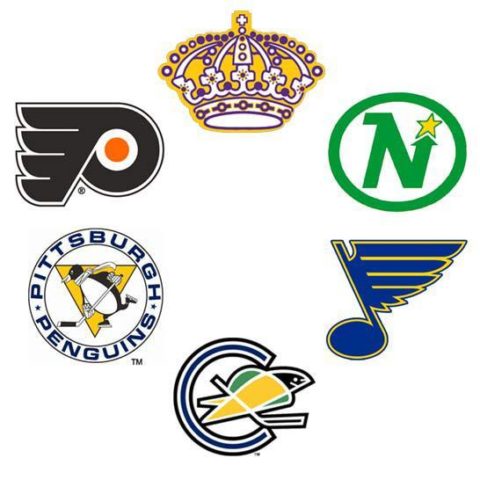
The Blues, on the other hand, quickly became the most promising expansion team, finishing third in the West Division in 1968 and first in 1969, advancing to the Stanley Cup Final both seasons only to be swept 4-0 by the Montreal Canadiens in back-to-back attempts.
St. Louis’ strong success out of the gate left sportswriters, coaches, and management of other teams scratching their heads, wondering what gave the new team an edge. Many people, like Pittsburgh Press sports reporter Roy McHugh, attributed the Blues’ spark to the electricity of their fans, who gave the team a standing ovation each time the players stepped onto home ice and cheered loudly with or without the prompting of the organist at St. Louis Arena. Of the atmosphere, Penguins general manager Jack Riley said:
“You go there [St. Louis Arena] and you’re a goal and a half down before the faceoff. Those fans are just unbelievable, the way they carry on,”
(from ‘All About the Birth of the Blues,’ Pittsburgh Press – 3/21/69).
Penguins fans, who topped out at 8,000 a game at the Civic Arena on a good night, couldn’t come close to replicating the dynamic atmosphere of 15,000 screaming Blues’ faithful. At the beginning of the 1969-70 season, Riley predicted that Pittsburgh fans would start showing up when the team started to win.
His assumption was correct.
Penguins & Blues Easter Sunday Puck Hunt
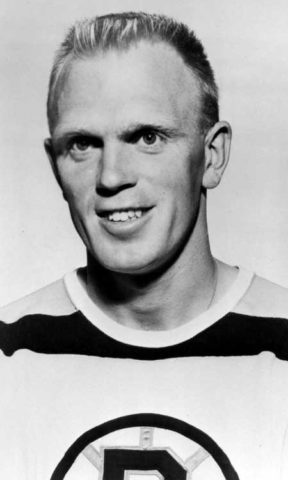
By the end of the 1969-70 season, the Penguins and their army were beginning to look like a formidable opponent for the best in the West. They were sitting in second place in the division, just behind the Blues, and were set to qualify for the playoffs for the first time in franchise history. They just had to survive the last few games of the regular season, one of which was an Easter Sunday battle with St. Louis at the Civic Arena.
The hard-fought game saw the Blues lose a one-goal lead three times leading up to the third period. They were leading 5-4 at 19:41 of the last frame when tough guy Bob Plager received a delay of game penalty for covering the puck in his own zone.
With just 19 seconds left to work, coach Red Kelly pulled the Penguins’ goaltender, Al Smith, in favor of an extra attacker. Ron Schock found an opening around St. Louis goalie Glenn Hall, tying the game, or so he thought. Just as the puck sailed by Hall, he realized the game clock wasn’t running.
Referee Bill Friday, unaware of the issue, called a goal on the ice and was met with ire from the entire Blues team before all you-know-what broke loose.
While some players continued screaming at Friday, Bob Plager started a fistfight with the penalty box attendant. Another Blues player tried to go after substitute timekeeper Bob Ferrins, who was insistent that he started the clock at the drop of the puck. In the middle of the melee, Blues coach Scotty Bowman even took an accidental stick to the forehead from one of his own players, resulting in a one-inch gash.
The fighting and shenanigans weren’t confined to the teams. Fans pelted the ice with debris, making a mess for the ice crew, which was exacerbated by the Blues’ Barclay Plager knocking over full trashcans and re-spilling the litter.
After a half-an-hour hiatus, it was determined through radio playback and club videotape that roughly ten seconds passed between the drop of the puck and the goal, making it legal. Friday insisted the teams return to the ice to play the final nine seconds of the game, which only served to stir the pot.
Following the final buzzer, fans attempted to hit or kick the Blues’ players as they left the ice, with one even tossing a lit cigarette onto captain Red Berenson while he was on the bench. The angry crowd followed the team to the exits and the police had to get involved to ensure the Blues made it to the airport safely.
Related: Pittsburgh Penguins Top Rivalries of the Crosby Era
The game itself – not to mention the conduct of the fans – was bad enough, but things had the potential to get worse given that the Penguins and Blues would meet one last time in the regular season, the following Saturday in St. Louis, and again in the semifinal round of the playoffs.
Blues Hand the Penguins Their First Playoff Series Loss
Though they were unable to win a game in Oakland during the regular season, the Penguins had no problem plowing past the Seals in a 4-0 sweep of the 1970 Stanley Cup quarterfinals. The North Stars put up more of a fight for the Blues, stretching the series six games.
And just like that, the Penguins and Blues would meet again, less than a month after their dramatic brawl at the Civic Arena.
The first game of the series at St. Louis Arena seemed to take a page right out of the Easter Sunday game’s playbook. The two teams combined for a total of 149 penalty minutes, the first of which were called just 19 minutes into the game when Blues’ defenseman Noel Picard pulled the shirt over Jean Pronovost’s head and Penguins’ enforcer Bryan Watson had to come to his defense.
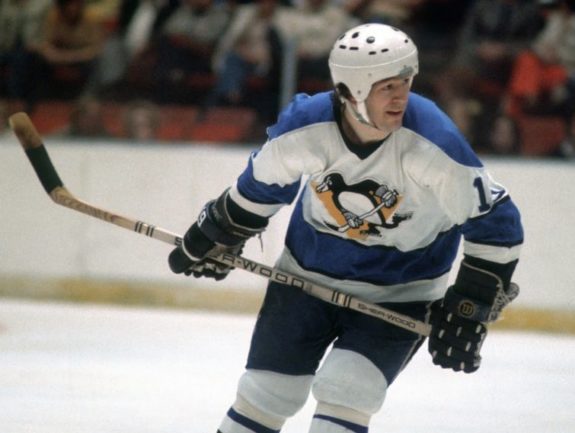
The Blues ended up taking the victory 3-1. Spokesmen for both teams had some explosive words following the game. An irritated Riley told Bill Heufelder of the Pittsburgh Press:
“They think they’re going to kick the hell out of us, but they’re not,”
(from ‘Blue Lightning Strikes Penguins,’ Pittsburgh Press – 4/20/70).
Meanwhile, Bowman was more upset with the way agitator Glenn Sather chirped his team most of the game.
“He couldn’t lick his lips. He’s all mouth. What a little [censored],”
(from ‘Blue Lightning Strikes Penguins,’ Pittsburgh Press – 4/20/70).
St. Louis took the second game at home to have a 2-0 series lead heading back to Pittsburgh, but Penguins’ fans were ready to give their team a boost, selling out Games 3 and 4, and 6.
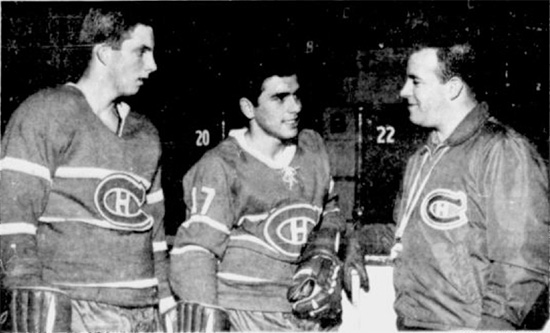
Bowman, unhappy following the two losses in Pittsburgh not only blamed referee Lloyd Gilmore for his officiating but also criticized Red Kelly’s coaching styles and his motivation tactic of dumping $7,250 on the locker room floor to illustrate just what was on the line for each player if his team won the Stanley Cup. Bowman said:
“If it works, you’re a hero. If it doesn’t you’re a bum. I personally don’t have that kind of money to throw around,”
(from ‘Pens, Blues Clash for Cup Edge Tonight,’ Pittsburgh Post-Gazette – 4/28/70).
At the time, Kelly looked like a genius. That is until the series moved back to St. Louis where the Penguins were blanked 5-0 by Jacques Plante and then saw their Stanley Cup dreams dissolve on the stick of Larry Keenan who netted the third-period game-and-series-winning goal for the Blues in Game 6.
Though the Penguins’ season was ending, a yearslong rivalry was just beginning, and the Penguins’ sweet revenge was served as they watched the Blues get swept in the Stanley Cup Final for the third year in a row, this time at the hands of the Boston Bruins.
The Aftermath of the 1970 Playoffs
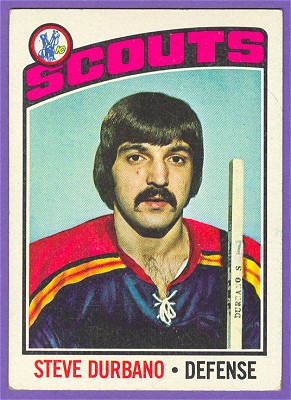
The Penguins and Blues enjoyed a trash-talking rivalry for four more seasons following the 1970 playoffs. Pittsburgh fans enjoyed holding up signs that read things like “Bucketmouth Bill and his Three Stooges: Barclay, Bob, and Noel,” and the players still participated in heavy-hitting, fist-flying battles multiple times a season, the most notable of those coming in 1974 following a trade between the two clubs.
A multiplayer deal on Jan. 17 sent Penguins Greg Polis and Bryan Watson to St. Louis to join Glen Sather who was picked up by the squad from the Rangers that summer. In return, “Battleship” Bob Kelly and Steve Durbano were shipped off to Pennsylvania. Just six days later, the two teams met at the Civic Arena in front of 13,324 fans who didn’t want to miss a chance to see their new enforcers at work.
The crowd wasn’t disappointed. In the second period, Durbano took shots at the Blues’ Bob Gassoff while Kelly battled with Barclay Plager. The Penguins won the game 4-1, and Kelly and Durbano were named co-No. 1 stars of the game, a first in team history. They skated onto the ice together with their arms raised. More importantly, their presence and performance showed that the Penguins were no longer a team that could be pushed around.
Following the game, Kelly told Dan Donovan of the Pittsburgh Press:
“The Blues won’t be bothering us too much anymore. I don’t think anyone will bother us too much,”
(from ‘Penguins Clean Up on Blues Before 13,324,’ Pittsburgh Press – 1/24/74).
The Blues, however, felt the opposite, with former-Penguin Watson saying:
“They beat us pretty badly. All the new Pittsburgh players are high, but we’re still 13 points ahead of them. Durbano and Kelly will find they can’t fight everybody in the league,”
(from ‘Watson, Polis Adjust to Life with “Enemy”,’ Pittsburgh Press – 1/24/74).
It turned out to be just big talk from fired-up players. Neither the Penguins nor the Blues qualified for the playoffs in 1974, finishing fifth and sixth in the West, respectively. That summer, the NHL reorganized the divisions again, moving the Penguins to the new Norris Division in the Wales Conference to join the Kings, Canadiens, Detroit Red Wings, and new expansion team, the Capitals. With the Blues in a separate division and with less frequent matchups, the rivalry fizzled out.
Skip ahead to 2019, when Pittsburgh was eliminated in the first round of the playoffs by the New York Islanders. Many Penguins’ fans have jumped on the Blues’ bandwagon, hoping to see them lock up their first Stanley Cup victory and send players like Brad Marchand home for the summer empty-handed. What a difference 45 seasons can make.